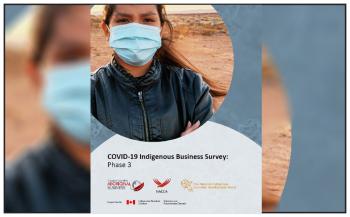Summary
Local Journalism Initiative Reporter
Windspeaker.com
Some progress is being made, but there is still plenty of work to be done to assist Indigenous businesses impacted by the pandemic.
A report titled COVID-19 Indigenous Business Survey: Phase III was released this past week.
Phase 1 of the report had been published in July 2020 and Phase 2 was released this past June.
Indigenous Services Canada has funded the project, which has been led by the Canadian Council for Aboriginal Business (CCAB). The National Aboriginal Capital Corporations Association (NACCA) and the National Indigenous Economic Development Board (NIEDB) have been project partners.
“The intent of the over-all project is to continually check in on Indigenous businesses and see how they are doing during the pandemic,” said Kaira Jakobsh, CCAB’s research project manager.
Jakobsh said the three surveys have included a number of the same questions.
“But each one brings in some new questions,” she said. “With this one we tried to dig in a bit closer on financing and debt and accessing funding.”
A total of 672 businesses sent replies to the latest online survey, which was available last year between June 30 and Aug. 4.
Jakobsh said the number of respondents in this recent survey was down from the 838 businesses that took part in the initial survey and also from the 825 that filled out the second survey.
Jakobsh believes the decrease in the number of businesses that replied can be attributed to the fact they in all likelihood also were asked similar questions from other sources.
“Indigenous businesses I think are being involved in those surveys a lot,” she said.
Some of the key Phase 3 findings, for the report released on Jan. 26, include:
- Indigenous businesses continue to experience negative impacts because of the pandemic. Two-thirds of respondents, 66 per cent, said the pandemic has negatively impacted their business operations.
- The most significant pandemic consequences on Indigenous businesses continue to be revenue declines (52 per cent) and the cancellation of meetings, gathering or events (37 per cent).
- Almost half of the survey respondents, 46 per cent, said they continued to have significant financial losses during the first six months of 2021, compared to the first half of 2019, the last pre-pandemic year.
- Exactly half of the survey participants, 50 per cent, said they had laid off staff either permanently or temporarily because of the pandemic.
“Over-all, with some of the trends, we’ve seen improvement over key areas,” Jakobsh said. “We’ve also seen a significant portion are still struggling.”
Data collected included information from businesses across numerous industry sectors that are owned by individuals who identify as First Nations, Métis or Inuit.
Because the survey was voluntary, the report did suggest data is unweighted and should not necessarily be considered a representative sample based on the actual number of total Indigenous businesses in the country.
Some of the more positive news from the report is included in its Current Needs section.
More than a year into the pandemic, 36 per cent of Indigenous business owners said they would not be able to keep their companies afloat without further supports. This figure is down from the 54 per cent who had expressed the same concern in May of 2020.
Also, encouraging is that six out of 10 businesses surveyed said they had an optimistic look for the next six months.
This marked a significant increase from the 37 per cent who had previously indicated they felt that way in January 2021.
Another positive is the fact Indigenous businesses have continued to build up their online presence.
“So many businesses are adapting to working online,” Jakobsh said.
The report also includes various calls to action and recommendations.
For starters, to help ensure Indigenous businesses are included in the country’s economic recovery, it is recommended to not only extend but also develop new pandemic benefits and business supports.
It is also recommended to develop resources for digital adoption and business administration. These in turn would improve long-term recovery and growth.
And other recommendation is to guarantee all government ventures focusing on business are accessible to Indigenous entrepreneurs.
Local Journalism Initiative Reporters are supported by a financial contribution made by the Government of Canada.

